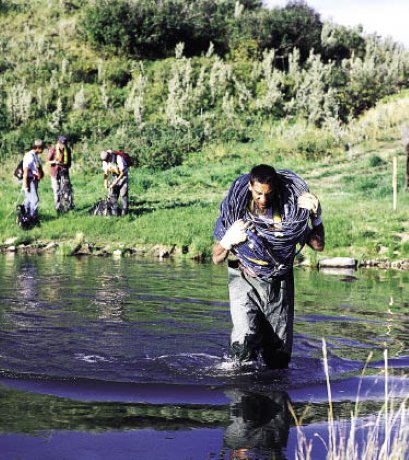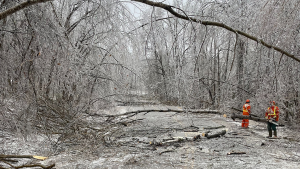Excellent opportunities for advancement.
Geophysical
Strangely named but sorely needed, workers who drag heavy equipment through rough terrain are a hot commodity in today’s market
Correspondent
TORONTO
Wanted: jughounds for doodlebugging, no previous experience required.
Excellent opportunities for advancement.
Natural resource and energy construction projects rely on significant exploration efforts. The unsung heroes of exploration; employees of geophysical contractors who lug heavy equipment through rough terrain to take seismic readings that may indicate the presence of hydrocarbons.
“The entire energy sector is demanding services, so in that respect, the crunch we’re facing is no different from anyone else,” says Mike Doyle, president of the Calgary-based Canadian Association of Geophysical Contractors (CAGC), which represents an industry comprising some 10,000 workers. “But our problem is going to get bigger and broader.”
Geophysical contractors are finding it difficult to recruit jughounds or “juggies,” labourers who carry heavy packs of equipment including cables and geophones, sound recording devices in packs that weigh as much 35 kilograms.
Doodlebugging is the process of laying cables through rugged terrain and placing geophones in a web-like linear pattern to record accurate seismic readings when explosives are detonated just below the earth’s surface.
Alberta Jughounds are paid $10 per hour to start, and work 90-hour weeks in 24-day cycles, though living expenses are covered and wages soon rise to about $15 per hour.
Many potential recruits quit the business before they start, leaving shortly after viewing recruiting videos. Others resign a few days into their first work cycle.
“We’re being hit from both sides, demographically,” says Doyle. “Owners and managers who are now mostly in their mid-40s and 50s are also moving out of the workforce with no one to replace them.
“Historically, we used to recruit from rural communities, but as family farms disappear we’ve broadened our recruiting to the entire country and we run ads continually. Many of our workers have come from the Maritimes. With managers moving out, there’s a lot of room for advancement in the industry.”
The upshot?
“It’s taking a toll on schedules,” says Judy Mahaffy, Brand Manager with Arcis, a Calgary-based company offering a range of geotechnical and seismic services. “There are a limited number of seismic field crews available to go out into the field. For smaller companies, the delays can be significant.”
Arcis, like many other geophysical contractors, maintains a crew of skilled technical operators and project managers who perform prep work at exploration sites. After the initial survey, outside services are contracted to lay cable and recording equipment to collect seismic data.
“Contracting out doesn’t change the labour situation,” says Mahaffy. “Their woes become our woes.”
Mahaffy says that environmental concerns have made field staff jobs more demanding.
“In the past, they would use heavy equipment to clear a wide path through the woods to lay the geophones. Using new low-impact seismic techniques, we’ve reduced the path footprint and now snake the cables around mature trees.”
The CAGC board of directors voted earlier this year to research the possibility of importing guest workers. However, Mahaffy says it may come down to financial inducement.
“It’s a physically demanding job,” she says. “They may just have to pay people more to attract workers.”
But resource companies are reluctant to allocate more money to exploration, says Doyle.
“The oil and gas industry as a whole is quite happy to stick its head in the ground and act like an ostrich,” Doyle says.
“Seismic has always been viewed as the lowest rung of the oil and gas industry, and exploration is generally viewed as a cost. There’s no revenue unless something has already been built.”
“It’s a physically demanding job. They may just have to pay people more to attract workers.”
—Judy Mahaffry
Arcis Brand Manager











Recent Comments
comments for this post are closed